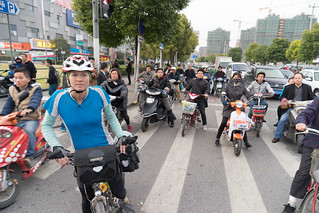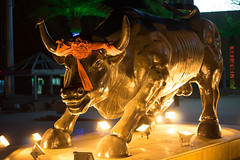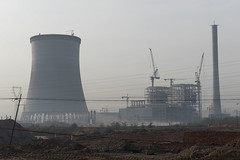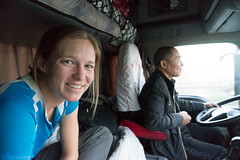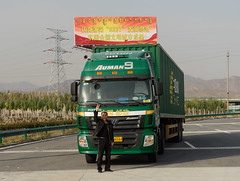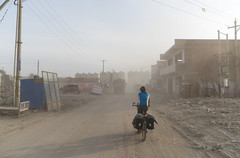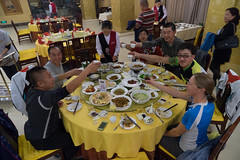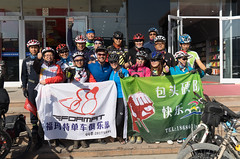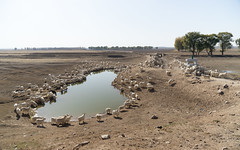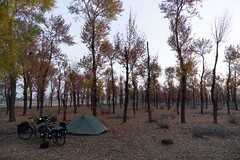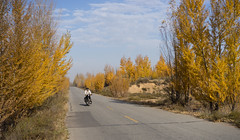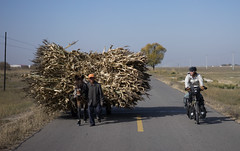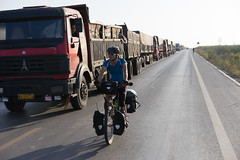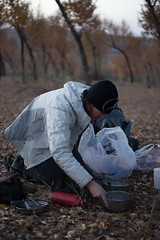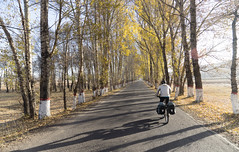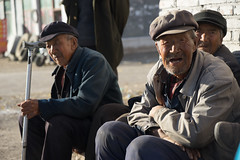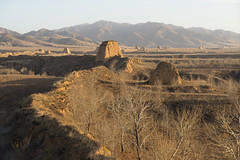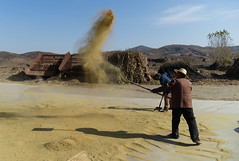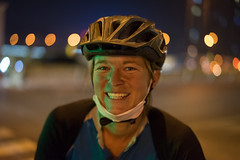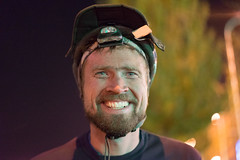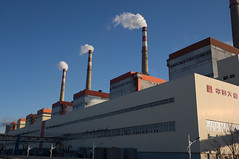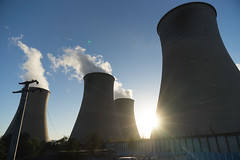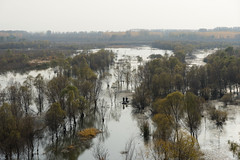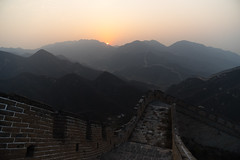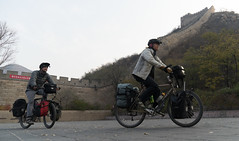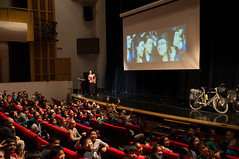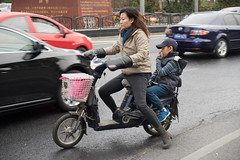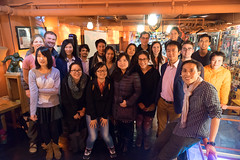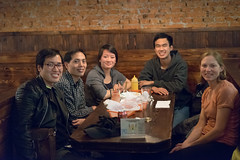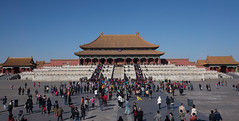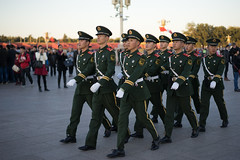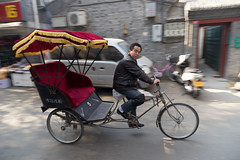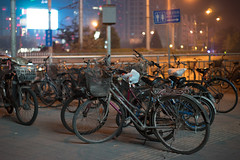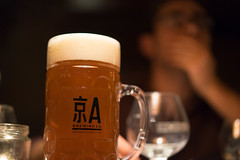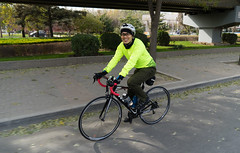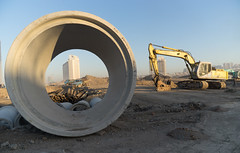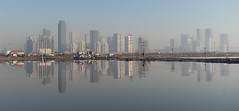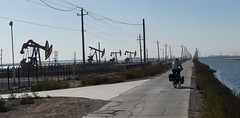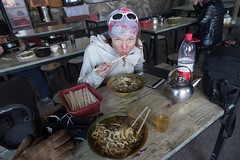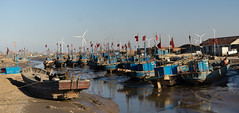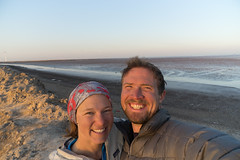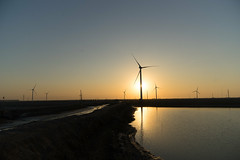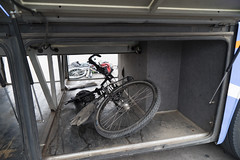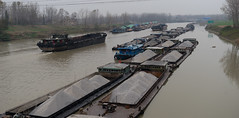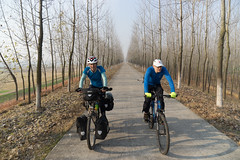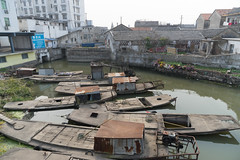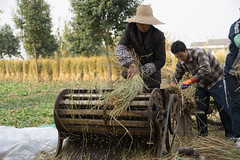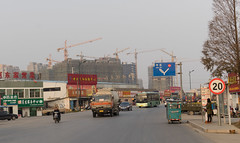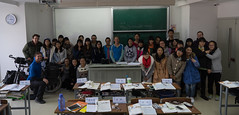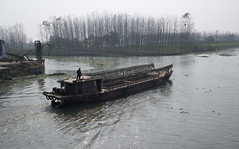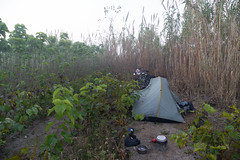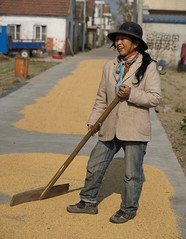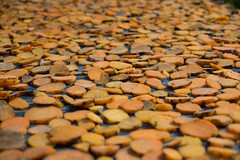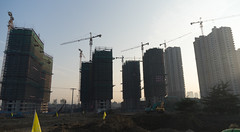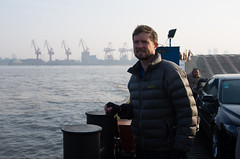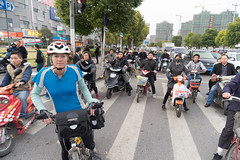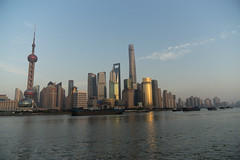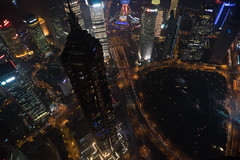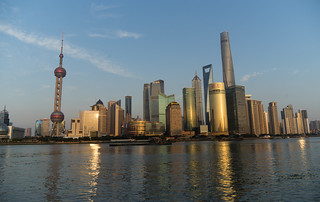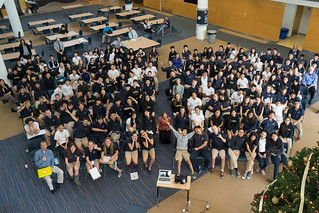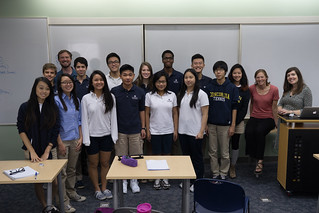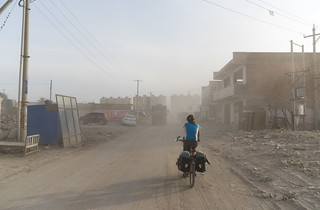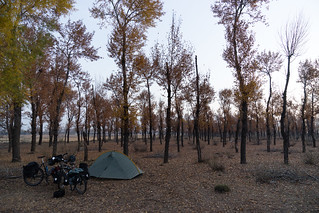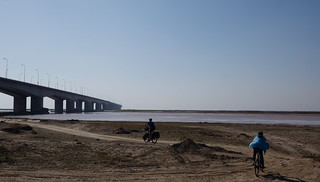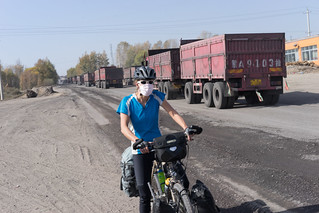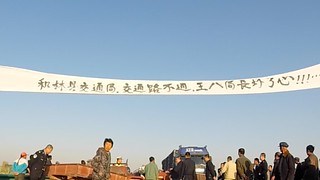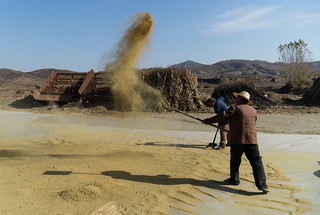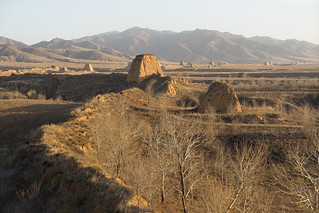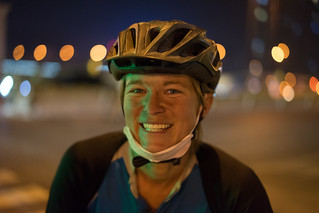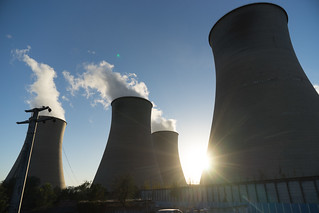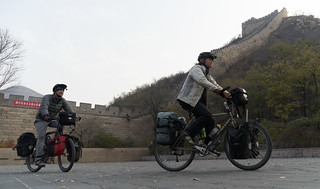With over a week to spare before our tour through Tibet started, we decided to bike from Beijing to Shanghai and catch the train from there. This would allow us to see more of eastern China and avoid sitting around, off the bikes, before a long time sitting on a train and then in a bus. First, though, we had to go to Mongolia to renew our visa. It was fairly straightforward, although we spent a great deal of time at the train station trying to get a ticket (they were all sold out because Beijing was on holiday during APEC), and then at the bus station standing in line (it turns out that you buy your ticket directly from the bus driver, who may just pick you up at a random intersection 2 hours after the bus is supposed to depart (but half an hour before the updated time you were given…). Eventually we boarded a sleeper bus (3 rows of tiny bunk beds) and found ourselves in the border town of Erlian (or Erenhot, or Erlianhot, depending on who you’re talking to). We walked to the train station and got a ticket back to Beijing for that night, then walked to the parking lot where the jeeps assemble that give you a ride to the border (you’re not allowed to walk it; see this excellent write-up if you need instructions on a Mongolia visa run). Eventually we were put in a minivan that drove us to the border, where we crossed out of China, into Mongolia, then walked out of the building, through a gate immediately outside, and back into the other side of the building. We were stamped out of Mongolia and back into China, then hopped in a jeep back to Erlian. The whole thing took under 2 hours.
When we got back to Beijing the next day, we emailed all of our friends and made a plan to meet up for farewell drinks, then ran around doing last-minute things to get ready to leave. That night, we were persuaded to try KTV, the Chinese version of karaoke – we were told they probably wouldn’t let us leave the country if the border guards discovered we hadn’t done it, so we of course acquiesced. It was surprisingly fun, though I had Britney Spears stuck in my head for the next few days. As a result of our late night, we got a late start out of Beijing. We were in a good mood though – we met our friend Alvin at Starbucks and thus had good coffee and good company for the ride out of the city. The air was still clear from APEC, and there were bike lanes through the center of the city and the sprawl on the far side. After a couple of hours Alvin turned around and we were on our own again.
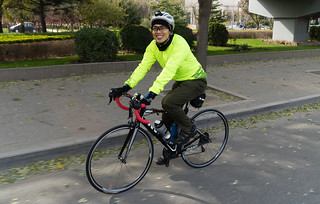
Given our good experience with Google walking directions on the way from Baotou to Beijing, we used them again and ended up biking through small farming villages by the end of the day. We were riding on a levee along a small irrigation canal, and we took a path that led into a village in order to get water for the night. We approached a middle-aged woman outside of her house; she didn’t understand at first and, looking distrustful, disappeared into her house. We were about to move on when she returned with a small bowl of water. By this time we’d gotten the water bladder out and we thanked her and asked if she had more. She led me into the courtyard, where I was able to fill up from a spigot. Her husband was much friendlier and we gestured amiably about his huge wire-encased piles of corn. David tried to interview him but he declined, so we went back outside. A man on a motorbike stopped and agreed to be interviewed. We were most of the way through, and a few smiling men had gathered around, when a well-dressed, younger man appeared out of nowhere, glanced at the interview sheet, and seemed to ask what was going on. We understood “meiguoren” – American – and can only assume that he told the man not to talk to us, because without another word, and smiling sheepishly, he drove away. We took that as our cue to leave, so we biked back up to the levee.
Not 10 minutes later, a police car appeared behind us and asked us to stop. They asked a bunch of questions, a few of which we understood but pretended not to – we figured playing dumb was our best bet. We couldn’t pretend not to understand their request to see our passports (at least not when one took out his ID card to demonstrate), so we got them out and they wrote down some details in a notebook. We were pretty sure they wanted to know where we were going; given that it was nearing sunset, saying we didn’t know where we were sleeping (or that we were planning to camp just off the levee) seemed like a bad idea, so we simply pointed to the closest town on the map, which seemed to reassure them. They gave us back our passports and got in their car, and a few awkward moments passed while we waited for them to leave. We realized, though, that we would have to make the first move – to do otherwise could arouse suspicions, and the driver was on the phone. So we waved as we rode past, and then debated what to do. We figured they would pass us soon, but we worried they would stop again or that whoever they were talking to would issue instructions to detain us. It was also starting to get dark, and there were towns up ahead – if we were going to camp, it was now or never. We looked back and couldn’t see the police car, so we plunged off the levee to a small path below, invisible to the road. It was a good place to camp, but we worried that the police would become suspicious when they failed to pass us on the way to wherever they were going. We looked at the map and saw an intersection just 2 km ahead. Given that drivers rarely have a good sense of the speed at which one travels by bike, we hoped that they would just assume we had turned off and wouldn’t feel the need to look for us and verify our whereabouts.

So we set about pitching the tent and making dinner, and were comfortably settled in when we noticed a strange light flashing across the landscape. I poked my head out to investigate and saw that a vehicle was driving along the levee, shining a strong searchlight from side to side. Our hearts started beating faster, but we knew we couldn’t be seen unless the driver walked to the side of the road and looked down. Soon the vehicle passed and we let out the breath we were holding. Shortly after, though, we saw the light again, this time from the field across the small canal we were camped next to. It seemed to be coming straight towards us, from the road on the far side through the field, and I ran outside to push the bikes over so it would be harder to spot us. We had already ensured that our panniers, with their reflectors on the side, were hidden under the tent, but if they happened to shine the light on the tent, we wouldn’t be able to hide. However, the vehicle didn’t come any closer, and while it did one more lap around the roads across the fields, they never found us, and of course we may not be what they were looking for. In retrospect it’s funny – did the police really care so much about a couple of foreigners on bikes that they would send out a search team? – but when you are, in fact, hiding, it seems that everybody looking for something must be looking for you.
We woke up early the next morning, relieved at having been able to camp in peace, and continued our ride along the canals. Later in the day, though, we rode into the port of Tianjin, and the biking got less pleasant. As evening neared, we had to make a decision: get a hotel in town, or try to bike through it to what looked like questionable camping on the outskirts. David wanted to see the port itself – the 10th largest in the world, we’d read – and the camping didn’t look promising, so we decided to stay in town after finding a hotel for 100 yuan ($16). David set off to visit the port while I got our passports out for the hotel to register us. Normally they just make a photocopy and enter something into a computer system, but their computer seemed to be down and they made a phonecall. I could tell something was going on, and when the woman behind the desk hung up the phone she confirmed my suspicions. She spoke no English but it was clear that we couldn’t stay there because we were foreigners. I reacted badly. It was getting dark, David was off on his bike, and I didn’t relish the thought of spending the rest of the evening hunting down a 3-star hotel that could accept foreigners and would undoubtedly be more expensive. The people running the hotel thought the whole affair was comical, which had the unfavorable result of angering me. I felt tired, cheated, and desperate. It’s such a stupid system and seems designed to squeeze money out of foreigners, restrict budget hotel owners’ customer base, and generally be a pain in the ass and confirm stereotypes of China being hostile – or at least uninviting – towards visitors. I didn’t have a lot of options, though, so I set off on a bit of a goose-chase to see what I could find.

Everything was more than we wanted to pay, and when I met David back at the original hotel, we debated just continuing to ride even though it was dark and the city was sprawling, but that didn’t sound too appealing. At this point our fairy godmother appeared on the scene. A woman a little older than us had been at the hotel when we returned, and when we asked for water she whisked David upstairs – he returned with six 1.5L bottles, saying he tried to take only four, but she wouldn’t let him pay or take any fewer. She then asked if we had eaten dinner. Come to think of it, we hadn’t, and as it was already late, we accepted her invitation to join her. She took us around the corner to a dumpling place, clarifying through google translate that it was her treat. We learned that she was the manager of the hotel and had just returned to town from Chengdu. She was from Tianjin, where her father lived, and her daughter was in college in Canada. She showed us pictures of her cat and listened as we tried to explain what the heck we were doing and what series of events led us to be helplessly standing in her hotel lobby that evening.
We said we wanted to stay at her hotel but weren’t allowed – unlike her employees she already knew the rule and seemed apologetic. She asked where we were going to stay and we said we didn’t know, at which point she firmly cemented her role as our guardian. After dinner, which she refused to let us pay for, she led us to a foreigner-approved hotel a few blocks away. It was above our budget, but at that point we didn’t feel that we had many options, and I reluctantly got out my card to pay. However, the machine didn’t accept it. I was digging into my wallet for cash when I saw her whip out her card. “No!” I exclaimed, and tried to take it from the man behind the desk. In China, this is a delicate affair and I’m not sure I fully understand the rules. Everything I’ve read warns not to fight over the bill at a restaurant when someone offers to pay, as this makes them lose face. Apparently it’s OK to offer once, with the understanding that your offer will be refused and then you must accept. We had been following this rule across the country, and many of our hosts had paid for our meals over our meager protestations. This felt different though. The room was expensive – about $25 – and it seemed different from a shared meal. I lost the card battle, though, so I then tried to give her cash, pretending that that had been the deal all along – you’ll use your card and I’ll pay you back – but again I was refused.
She then begged us to have breakfast with her the next morning, and of course we couldn’t say no. We told her we were leaving very early, though, at 6:00, and she said she would be there at 5:45. We thanked her profusely and said goodnight, and, shaking our heads at this turn of events, went to sleep. The next morning, the phone rang at 5:40 and we rushed out to find our new friend standing in the lobby with a pot of wonton soup. We made instant coffee and ate our breakfast, stumbling through a continuation of the conversation from the night before. She called her daughter in Canada, and we were able to have her translate our gratitude to her mother. After breakfast, we said our goodbyes and rode out of town, following small levee roads between a vast network of ponds. Some were used for fishing, some for salt production. There were also oil rigs bobbing along the roads and it was an altogether peculiar landscape.

We wove our way out towards the coast, hoping to ride along the water for some of the day. Once we got close, with a small village still between us and the sea, we realized that if we made it all the way to the water we would have officially crossed all of Asia. Of course, this made us want to get to the coast, despite the late hour and our hopes of hitching a ride a bit south that evening (we had to get to a certain point within 2 days to meet a friend who happened to be in Shanghai for a conference – he planned to rent a bike, take a bus 5 hours to meet us, bike the following day, and bus back that evening). We followed the ever-narrowing levee roads that wound around canals and inlets, passing a weary fleet of fishing boats, blue paint peeling and faded flags waving from their masts. We rode through a wind farm, turbines spinning in the sea breeze, and eventually found ourselves within sight of the water. However, as we rode down the most promising looking road, we discovered an obstacle – a fence stretched across the road, and mucky tidal channels on either side made getting around them an unlikely – or at least a very muddy – prospect. We were considering this, though, when we saw a man on a motorcycle on a levee parallel to ours. There was no fence there, so we asked him how to get there. He motioned around to the road that would bring us there, and in a few minutes we had made it to the edge of the continent.
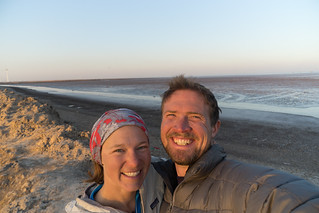
I wasn’t really prepared for it – we hadn’t set out to cross the entire continent west-to-east; getting to the coast was never a goal – and yet there we were, 6 months and 9,000 km after our start in Istanbul. It felt surreal, yet also anticlimactic – we weren’t finished, after all; this was just one unexpected milestone on a meandering, loosely planned journey, and once we reached Shanghai we would take a train halfway back across the country to Lhasa, then cross over into Nepal to tackle a segment of South Asia. Nonetheless, it was a sweet moment – the closest we’d been to home since we started – and it felt like if we decided to cut our journey short, for whatever reason, we would have accomplished something significant by crossing the entire continent, even if we had the help of the occasional train or bus.
From the coast, we rushed in the fading light to a tollbooth for a highway we hoped would take us to our first hitchhiking destination, Binzhou. We showed our note to the tollbooth operator, and within about half an hour, he ran out to tell us a bus on its way to Binzhou was there. We ran over to the bus, but to our expectant “Binzhou?” the driver said no. A very confusing conversation ensued, and we ended up not getting on the bus – which turned out to be going the right direction, and was the last one of the day. However, the tollbooth workers invited us in for dinner, so we went to the building by the tollbooth, where the cook fired up the stove and made us noodles while the others tried to understand what we were trying to do. The general consensus was that (a) we were crazy and (b) we should go into town the following day and catch a bus. We were used to both reactions, but we didn’t like the idea of going to the bus station. They seemed to indicate we’d have a decent chance of getting a ride with a truck at the onramp closer to town, though, so we decided to spend the night at the tollbooth ‘guesthouse’ (which did not look at our passport or call the police) and go to the other onramp early the next morning. Before going to sleep, David was required to play ping-pong with the tollbooth “boss” – it was a pretty even match.
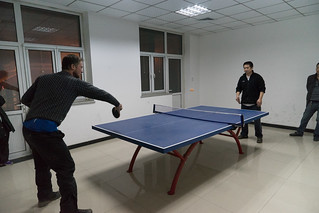
We left the next morning when it was still dark, but despite our early start we had no luck getting a ride, so in mid-morning, feeling defeated, we biked into town and caught a bus to Binzhou, on the banks of the Yellow River. Once there, we biked to the river for a last look. It was cool to see it again after having followed it for so much of its course – from clear tributaries on the Tibetan Plateau, to the wide river we’d taken a ‘ferry’ across in Gansu Province, and the reservoir where the Buddhist caves were located, to the polluted river that ran through Lanzhou and Baotou, to this point, almost at its mouth.

After a few minutes at the river, we cycled to the freeway onramp and started waving down trucks. We were able to catch a ride to Zibo, and then took another bus to Linyi, where we spent the night. We didn’t love relying so much on buses, but we needed to meet our friend and hitching wasn’t working out as well as we had hoped. We actually thought we’d have good luck after Zibo, where we were dropped off at a busy onramp, but there were police there who, after awhile, politely – but on no uncertain terms – asked us to ‘please go to the bus station.’ The next day we took another bus and arrived in Huai’an, where we were meeting our friend, in the mid-afternoon.
We then took ourselves on a short bike ride – we wanted to see the Grand Canal and this was the last town on our route that it passed through. We did a loop southwest out of town, passing a side canal with big barges full of sand going through locks, and the came upon the main branch of the canal. It was cool to see – full of boats and clearly well-used, but it was starting to get dark and raining lightly, and we realized that the canal actually went through the center of town and we could have saved ourselves time and trouble by going there instead. Still, it was nice to get a little riding in and to see the fields and gardens in what felt like the outskirts or suburbs of Huai’an. However, we realized we had a small problem: we were supposed to meet our friend, who would arrive by bus at 7:00, but when we arrived, we learned that there were 3 bus stations in town. We’d come into the north one, and we tried to figure out where the bus from Shanghai would arrive. His best guess was the main station, and since it was roughly in the middle of the other 2, we decided to get a hotel near it. We sought out the 7 Days Inn, a chain where we had stayed before and found to have the best rates of the foreigner-approved hotels, and waited for him to arrive. Unfortunately, his bus arrived at the south station and he had to bike 7 km through an unfamiliar city in the dark and rain. He was a good sport about it though, and eventually he arrived at our hotel. After 6 months of strangers, it was great to see another face we knew. We wandered around town and found dinner, and DJ told us about what he was up to in China and we tried to compress the last 6 months into a conversation over dinner.
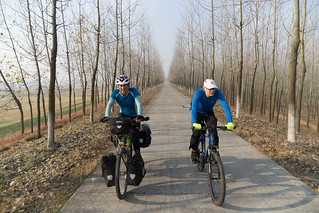
We woke up early, had oatmeal and Nescafe in our hotel room, and left at sunrise. We had a long day ahead of us – it’s unusual for us to have a concrete plan in the middle of a segment, but we’d planned around our friend joining us and found a warmshowers.org host in Yancheng, which had good bus connections to Shanghai. We rode through the city, which like so many other mid-size cities in China (about 2 million) was a giant construction zone with high-rises popping up everywhere, and then got into the countryside. The riding was beautiful, again following back roads and levees along canals. DJ, who had originally sworn he would never bike in eastern China, was suitably impressed. We made good time and arrived in Yancheng with plenty of time for DJ to make his bus. Our hosts were lovely – a young American couple, Alyssa and Peter, teaching English and computer science. They were recent graduates from Calvin College, a Christian college in Michigan and the rival of the college where David’s parents had gone. They made pasta with lentils and vegetables, and their friend Becca joined us for dinner. It was fascinating talking with them – they had many if the same interests and questions about China that we did, and since they spoke Chinese and had lived there for over a year, they were able to tell us a lot about the country.
For example, Alyssa and I were talking about the “individual (Western) vs. collective (Eastern)” concept that we had read about in The Geography of Thought, and she said in her experience the Chinese aren’t necessarily more concerned about society than Americans, but that rather than focusing on the individual or the collective, writ large, they focus on the family. They will do whatever is in their family’s best interest, not just their own or for the good of the whole. We also talked about dating and homosexuality. Apparently young people do date, but not casually – it’s very marriage-focused, and once you finish college you’re expected to get married. It’s not necessarily taboo to be gay, but if your kid is gay you might be upset, largely because it reduces your chance of a grandchild. We asked our hosts, who were Christian, about religion; a couple of our friends in Beijing were also Christian, and they said churches had to be approved by the state, and they had to show their passports to go in – I think only foreigners were allowed in those churches. In Yangchen, our friends said that they just held church services at people’s homes.
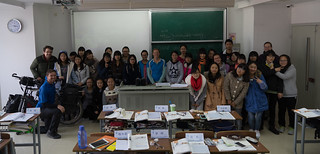
We did a presentation for Alyssa’s class the next morning, which was fun but meant we got a late start. Also, David was coming down with a cold so the next couple of days of hard biking didn’t look too appealing. Nonetheless, we had a good day – again we followed small roads that wound through villages and along canals, and we found people to be less shy and friendlier than in Inner Mongolia and Shanxi. While there were still few children, on average the population here felt younger, and it seemed more prosperous; we had heard that Jiangsu was a fairly well-to-do province, and our observations backed that up. Like in Uzbekistan, some of that seemed connected with the prevalence of water. We had been struck by the contrast between the dry, dusty Aral Sea communities and the towns upstream where the water was diverted to.
People in places with water simply seemed to have more. Despite this, communication was still difficult, and the countryside was so densely populated and planted that we didn’t think we’d be able to find a place to camp. We decided to get water anyway, since the nearest town that was likely to have a hotel was quite a ways away. We ducked off the highway and asked a cluster of old women for water. They didn’t understand, but a well-dressed older man appeared and figured out what we were asking for. He took the water bladder and returned with it completely full. We thanked him and then asked if we could interview him. He agreed, and as we finished up an official-looking vehicle approached from a nearby road. “Oh no,” I thought, “here we go again.” We packed up the camera, said goodbye, and rode away as quickly as we could without looking suspicious. Fortunately we weren’t followed, and soon we found ourselves in another village that looked like it might have some space for camping in the fields along the road. We asked a group of men about camping, and they invited us to pitch our tent on the concrete platform outside their shop, right next to the road. We didn’t think this would work very well, so we thanked them and continued on. We asked a few more people, and they all gestured vaguely off to the fields by the side of the road. This was encouraging – though we didn’t have the protection and social experience of staying in or next to somebody’s home, it felt good to have permission. Still, we didn’t want people to know where we were, so we waited until it got dark and then turned off onto a small path through the field, where we had seen a sheltered clearing that looked good for camping. It was a comfortable night – not too cold, not too warm, no interruptions from the village, and we woke up early and got on the road.

The next day was similar, though we spent more time on a highway and the population grew thicker as we went south. We biked through one village where we chatted with a woman who can only be described as jolly. With a round, smiling face under a brimmed hat, she was spreading her rice out to dry on the road. She seemed to understand that foreigners like us needed special treatment, and she spoke slowly using simple words. It may count as my first conversation in Chinese, rudimentary as it was: Where are you going? Shanghai. Where are you from? America. We like China. What is this? Rice! Oh, rice! We interviewed her, and a man came up while we were talking and joined the conversation. While we don’t know how they answered the questions they seemed to be in agreement about whatever they were saying. He disappeared for a moment, then reappeared with two steamed buns from his house. They were hot and delicious, and it felt good to be offered food. Later that day we were invited to eat twice (I think; “have you eaten” is also apparently a common greeting, and I don’t know how to tell the difference).
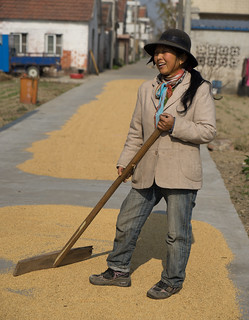
We declined because we were in a hurry, but it was a nice contrast to the non-responsive old men who seemed indifferent or afraid of us in so many other villages we’d gone through. We spent the night in a hotel in Nantong, leaving us with about 120km the following day. We took a ferry across the Yangtze from the west side of town (Google maps indicated that there was one on the other side of town, which would have been better, but we couldn’t confirm its existence and we’d had trouble with Google’s ferry directions before). The tickets were cheap (10 yuan each; or maybe 5 yuan each, including the bikes as passengers), and a boat left within 15 minutes of our arrival. The ferry took about a half hour, and it was cool crossing the giant river – we couldn’t see the other side, thought that may have been due to air quality as much as its size. Large ships travel that far up the river, and there was an active port and barges full of gravel, not to mention a big power plant right next to the river.

After getting off the ferry on the other side, we biked through a surprisingly pretty area bordering the river – there were marshes and birds and it was hard to believe we were biking near the biggest port in the world, Shanghai. After that, though, we pretty much followed one road – it was flat and straight and a bit boring, but pleasant enough. Suddenly, though, we were on the outskirts of Shanghai, and we were engulfed in the city’s energy. The decision to go to Shanghai had been so last-minute that I’d had no time to read about it or build up expectations. I just remembered reading about the city around the time of the 2nd world war, and the chaos and disorder described made me slightly terrified. However, we were both caught up in what turned out to be an enjoyable cacophony – there were bike lanes so we didn’t have to tangle with the cars, but they were packed to the brim with motorbikes, 3-wheelers, bicycles; turning left at a major intersection required careful study, but there was an art to it; cross the first lane while they were stopped; use the space between the lanes going each direction to ease left so you don’t have to cross the traffic that will come towards you when the light turns; slide into your intended slot along with the rest of the bikes when the other lane stops; and you’re on your way.
My friend Angie’s parents had generously agreed to let us stay at their apartment, though they were out of town. They live on the west side of the city, and we arrived with relatively little difficulties right after sunset. The city felt alive and we were excited to be there, but we were exhausted. Angie’s cousin, Tony, lives upstairs and met us outside the apartment. He helped us get settled in, bringing us fruit and bread and showing us a place to eat. He turned out to be our guide for the next couple of days, taking us to a huge dinner the following day and setting up an interview with a local expat magazine. We had a great time in Shanghai but barely got to explore – it’s a city I’d like to go back to someday.
